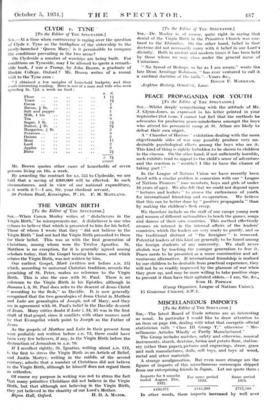THE VIRGIN BIRTH
- [To the Editor of THE SPECTATOR.] SIR,—When Canon Mozley writes of " disbelievers in the Virgin Birth," he misrepresents me. A disbeliever is one who refuses to believe that which is presented to him for his belief. Those Of whom I wrote that they " did not believe in the Virgin Birth "'had not had the Virgin Birth presented to them for their belief. This was so with the first generation of Christians, among whom were the Twelve Apostles. St. Matthew is no exception, for it is generally agreed among scholais today, that the Gospel bearing his name, and which relates the Virgin Birth, was not written by him.
Our earliest Gospel, Mark (written not before A.D. 55) which, according to universal . Christian tradition, records the preaching of St. Peter, makes no reference to the Virgin Birth. This is also the case with St. Paul. There is no reference to the Virgin Birth in his Epistles, although in Romans i. 3, St. Paul does refer to the descent of Jesus Christ " according to the flesh," as Davidic. It is now generally recognized that the two genealogies of Jesus Christ in Matthew and Luke are genealogies of Joseph, not of Mary, and they are in agreement with St. Paul's belief in the Davidic descent of Jesus. Many critics doubt if Luke i. 34, 35 was in the first draft of that gospel, since it conflicts with other sources used by that Evangelist which point to Joseph as the Father of Jesus.
As the gospels of Matthew and Luke in their present form were probably not written before A.D. 75, there could have been very few belieVers, if any, in the Virgin Birth before the destruction of Jerusalem in A.D. 70.
If I recollect rightly, St. Ignatius, writing about A.D. 112, is the first to stress the Virgin Birth as an Article of Belief, and Justin Martyr,- -writing in the middle of the second century; admits that a number of Christians did not believe in the Virgin Birth, although he himself does not regard them as orthodox.
Of course my purpose in writing was not to stress the fact that many primitive Christians did not believe in the Virgin Birth, but that although not believing in the Virgin Birth, they yet believed in the chastity of our Lord's Mother.










































 Previous page
Previous page